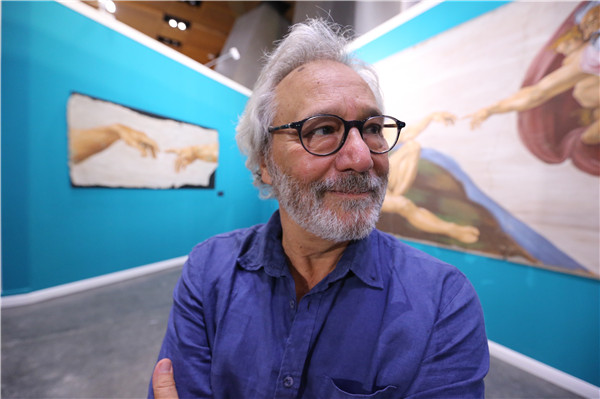Visitors at the ongoing exhibition that showcases copies of Michelangelo's most celebrated works and his architectural designs at the Bird's Nest Culture Center in Beijing. [Photo by Jiang Dong/China Daily]
Italian artist and art historian Giorgio Vasari (1511-74) published one of Michelangelo's two biographies during the Florentine artist's lifetime. He is also known for writing other artists' biographies.
Although he was criticized for favoring Florentine artists in his writings, most agree that his comments don't exaggerate the status of David in art history.
The original 5-meter-high statue of David is on display at the Gallery of the Academy of Florence. But a reproduction of the same size is now on show at the Bird's Nest Culture Center, at Beijing's National Stadium, the main venue for the 2008 Summer Olympics.
It is the centerpiece of The Divine Michelangelo Art Exhibition, a show which runs through Oct 10.
The show features copies of the Renaissance man's most celebrated works and also his architectural designs.
In addition to David, the reproductions on show include The Pity, another signature work, which depicts a seated Mary holding the body of Jesus on her lap.
The original is housed at St. Peter's Basilica in Vatican City.
Michelangelo completed the two works before he reached the age of 30.
The exhibition also has reproductions from another body of work-the frescoes on the Sistine Chapel ceiling. The scenes include The Creation of Adam.
The reproductions are painted by Antonio de Vito, the exhibition's Italian curator and also a fresco painter based in Florence.
De Vito, who has also done copies of Michelangelo's sketches and drawings, says that the idea behind the exhibition is to provide a look at the artist, so that when viewers finish their tour, they have a basic idea of Michelangelo's greatness as a sculptor, a painter, an architect and a poet.
Antonio de Vito, curator of the show. [Photo by Jiang Dong/China Daily]
"For Michelangelo, it was an easy job to create a comparison of light and shadow in his output," he says.
"That is why he was able to show such vivid faces in his sculptures and paintings. He conveyed the power of these figures, rather than simply focusing on sculpting or painting the outlines."
A studio has also been re-created at the exhibition to show how Michelangelo sculpted and painted. De Vito will demonstrate in the studio how a fresco was painted in 15th-century Italy.
"As an artist and scholar, I needed to understand his mind and how his hands worked.
"As I recreated these works I came to better understand how Michelangelo was different from other artists."
He adds that the exhibition also shows viewers the hardships Michelangelo faced when painting the Sistine Chapel ceiling.
"Doing a fresco like that is complicated because painters have to execute their work very quickly before the fresh plaster and the pigment mixed with water get dried.
"It became an even more difficult task for Michelangelo, because unlike many other artists of his time, he paid much attention to detail."
De Vito says Michelangelo worked with the same aim when doing sculptures and designing architectures. He says that when Michelangelo sculpted on a piece of marble, he wasn't guided by the whole picture. He started with the details.
He says that because of the great difficulties involved, today there are very few fresco painters who employ techniques from the Middle Ages.
He says that while Leonardo da Vinci and Raphael also tried doing frescoes, Da Vinci could not made a success out of it, while Rahpael had many people assisting him. In comparison, Michelangelo worked alone.
De Vito says the exhibition shows that Michelangelo still connects with today's world.
He says that although technological advancements have brought much convenience, the Florentine master's view still holds true that men should be the "managers" of themselves and should "defend" what they believe.
"He sculpted David out of marble. He set an example of what an artist should do-creating something out of nothing."


















